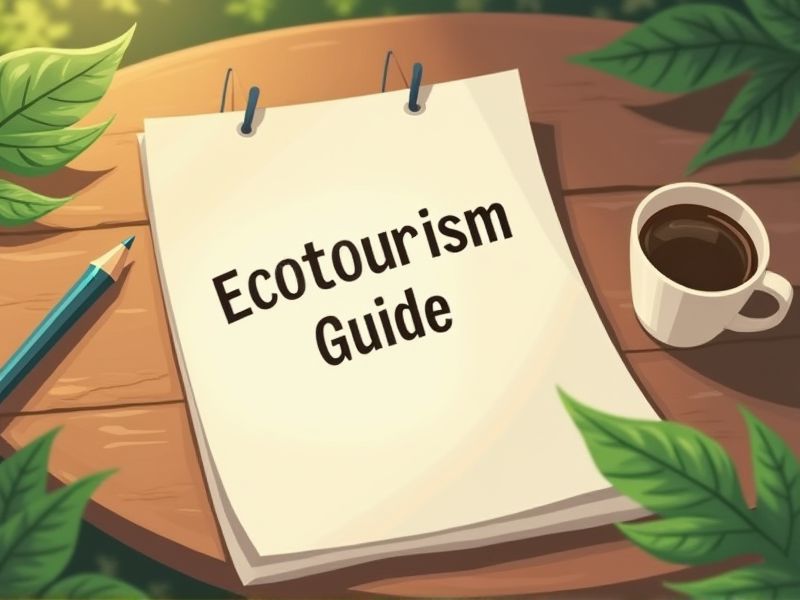
Entering the field of ecotourism requires a guide to possess a deep understanding of environmental conservation, local ecosystems, and sustainable travel practices. Certification ensures that these guides are not only knowledgeable but also adhere to ethical standards and practices vital for protecting natural resources. These credentials also help in building trust with tourists who seek authentic and responsible interactions with nature. Some important certifications you may need for being an ecotourism guide include those in environmental education, wilderness first aid, and sustainable tourism.
Certified Ecotourism Guide (CECG)
Ecotourism requires a deep understanding of environmental and cultural sustainability, and a Certified Ecotourism Guide (CECG) ensures that guides are trained to promote these values genuinely. Certification provides tourists with confidence that the guide will offer responsible and educational interactions with the natural and cultural environments. Uncertified guides may inadvertently harm ecosystems or misinform tourists, undermining the principles of ecotourism. The CECG designation also sets a standardized level of quality and ethics within the industry, fostering trust and consistency across different ecotourism operations.
Wilderness First Responder (WFR)
Ecotourism guides often operate in remote and rugged environments, increasing the likelihood of encountering emergencies far from medical facilities. WFR training equips guides with the necessary skills to manage medical and trauma situations, ensuring the safety and well-being of their clients. Understanding risk assessment and emergency response can enhance the trust and confidence of tourists in their guides. The presence of a WFR-certified guide can significantly reduce the potential for severe outcomes in outdoor emergencies.
Leave No Trace Trainer Certification
Ecotourism guides with Leave No Trace Trainer Certification effectively minimize their environmental impact, encouraging sustainable tourism practices. This certification builds trust and credibility with eco-conscious travelers, potentially increasing a tour's popularity. Guides equipped with these skills can educate tourists on preserving natural habitats, resulting in long-term conservation benefits. Certified guides fulfill increasing industry demand for responsible tourism operators, enhancing job opportunities in conservation-focused travel sectors.
Sustainable Tourism Certification
Sustainable tourism certification ensures that ecotourism guides adhere to environmental conservation standards, reducing their ecological footprint. By certifying guides, travelers receive assurance of a commitment to responsible and ethical tourism practices. Certification helps promote economic benefits for local communities by ensuring guides support local businesses and cultures. It also enhances the credibility and marketability of guides who meet international sustainability standards.
Environmental Interpretation Certification
Environmental Interpretation Certification is needed for ecotourism guides because it ensures they possess accurate knowledge about ecosystems, which enhances their credibility and trust with tourists. Certification provides guides with effective communication skills, allowing them to convey complex environmental concepts in an engaging manner. Certified guides are better equipped to educate tourists on sustainable practices, which can lead to more conservation-minded behavior. The certification process often includes safety and ethical training, ensuring that tours have minimal negative impact on the natural environment.
National Outdoor Leadership School (NOLS) Wilderness Skills Certification
The NOLS Wilderness Skills Certification equips ecotourism guides with essential survival and leadership skills, improving safety standards for clients. Training in navigation, first aid, and environmental ethics helps guides minimize risks and respond effectively to emergencies in remote areas. Certified guides demonstrate commitment to sustainable practices, attracting ecotourists who value environmentally responsible tourism. This certification differentiates guides in a competitive industry, enhancing career opportunities and client trust.
Eco-Adventure Instructor Certification
An Eco-Adventure Instructor Certification ensures guides have comprehensive knowledge of sustainable practices, which reduces the environmental impact of ecotourism activities. This certification enhances safety measures for tourists, as certified guides are trained to handle unpredictable situations in diverse natural settings. Certified instructors can provide an enriched educational experience, promoting a deeper understanding of local ecosystems and conservation efforts among tourists. Certification often boosts credibility, attracting environmentally conscious travelers who prioritize eco-friendly and responsible tourism experiences.
Environmental Education Certification
Environmental Education Certification equips ecotourism guides with specialized knowledge about local ecosystems, enhancing their ability to educate tourists accurately. This certification fosters sustainable tourism practices, as informed guides can implement eco-friendly strategies that minimize environmental impact. It helps in building credibility and trust with tourists, who increasingly seek authentic and knowledgeable experiences. Certification often leads to better compliance with regulatory standards, reducing the risk of environmental degradation and ensuring legal operation.
Wildlife Conservation Certification
Wildlife Conservation Certification equips ecotourism guides with the knowledge to minimize environmental impact, fostering responsible tourism. This certification builds credibility and trust among travelers seeking sustainable experiences. Educated guides help in preserving biodiversity, directly influencing ecosystem health. Certification promotes standardized practices, ensuring consistent and ethical wildlife interaction.
Cultural Heritage Interpretation Certification
Cultural Heritage Interpretation Certification equips ecotourism guides with skills to effectively communicate the cultural significance of natural sites, enhancing visitor understanding and appreciation. This certification ensures guides present accurate and respectful narratives, preventing the spread of misinformation and cultural misunderstandings. Trained guides can engage tourists more meaningfully, which can increase visitor satisfaction and repeat visits. Certification also aligns with sustainable tourism practices, promoting respectful interaction with local communities and environments.
Summary
When you pursue certifications as an Ecotourism Guide, your credibility and expertise significantly increase. This can attract more tourists seeking responsible and sustainable travel options, enhancing your business opportunities. Certified guides often access exclusive networks and resources, enabling you to offer richer and more informed experiences. The certification process also instills industry-leading practices that improve the quality of your tours, fostering traveler trust and satisfaction.
